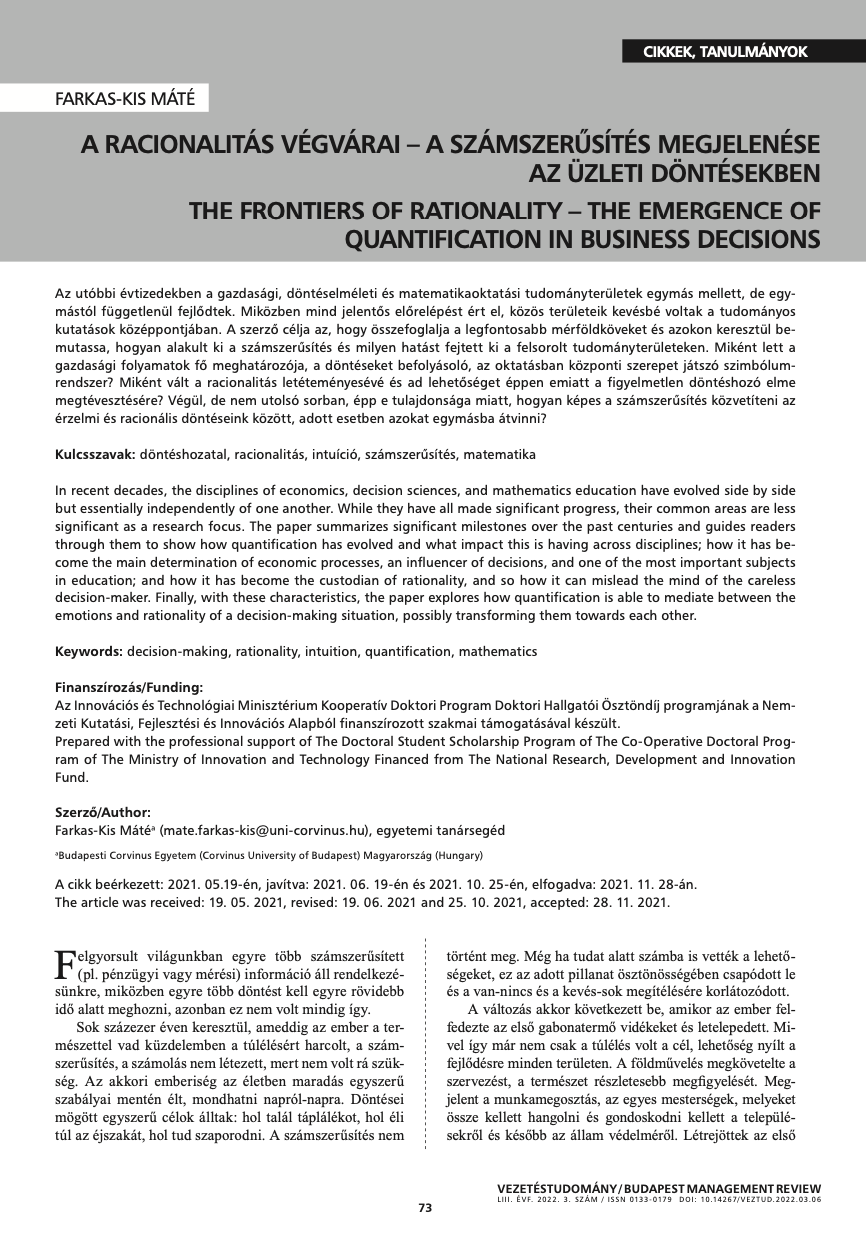A racionalitás végvárai
A számszerűsítés megjelenítése az üzleti döntésekben
DOI:
https://doi.org/10.14267/VEZTUD.2022.03.06Keywords:
decision-making, rationality, intuition, quantification, mathematicsAbstract
In recent decades, the disciplines of economics, decision sciences, and mathematics education have evolved side by side but essentially independently of one another. While they have all made significant progress, their common areas are less significant as a research focus. The paper summarizes significant milestones over the past centuries and guides readers through them to show how quantification has evolved and what impact this is having across disciplines; how it has become the main determination of economic processes, an influencer of decisions, and one of the most important subjects in education; and how it has become the custodian of rationality, and so how it can mislead the mind of the careless decision-maker. Finally, with these characteristics, the paper explores how quantification is able to mediate between the emotions and rationality of a decision-making situation, possibly transforming them towards each other.
Downloads
References
Allison, G. T. (1969). Conceptual Models and the Cuban Missile Crisis. American Political Science Review, 63(3), 689–718. https://doi.org/10.1017/s000305540025853x
Artelt, C., Baumert, J., Julius-Mc-Elvany, N. & Peschar, J. (2003). Learners for Life: Student Approaches to Learning. Results from PISA 2000. Paris: OECD.
Berne, E. (1984). Emberi játszmák. Budapest: Gondolat Kiadó.
Brocke, J., Simons, A., Niehaves, B., Riemer, K., Plattfaut, R., & Cleven, A. (2009). Reconstructing the giant: On the importance of rigour in documenting the literature search process. In 17th European Conference on Information Systems (ECIS 2009) (pp. 2206-2217). Verona, Italy: ECIS. https://webdocs.uni.li/public/04046767.pdf
Chikán, A. (2017). Vállalatgazdaságtan. Budapest: Vállalatgazdasági Tudományos és Oktatási Alapítvány.
Csapó, B. (2002). Az iskolai tudás. Budapest: Osiris Kiadó.
Csapó, B. (2012). Mérlegen a magyar iskola. Budapest: Nemzeti Tankönyvkiadó.
Engländer, T. (1999). Viaskodás a biztonytalannal. Budapest: Akadémiai Kiadó.
Neumann, J. & Morgenstern, O. (1955). Theory of games and economic behaviour. Princeton: Princeton University Press.
Kahneman, D. (2012). Thinking, Fast and Slow. New York: Farrar, Straus and Giroux.
Lehrer, J. (2012). Hogyan döntünk? Budapest: Akadémiai Kiadó.
March J. G. & Simon H. (1965). Organizations. New York: Wiley.
Peters, E., Västfjäll, D., Slovic, P., Mertz, C. K., Mazzocco, K., & Dickert, S. (2006). Numeracy and Decision Making. Psychological Science, 17(5), 407–413. https://doi.org/10.1111/j.1467-9280.2006.01720.x
Peters, E. (2012). Beyond Comprehension: The Role of Numeracy in Judgments and Decisions. Current Directions in Psychological Science, 21(1), 31–35. https://doi.org/10.1177/0963721411429960
Piaget, J. (1970). Válogatott tanulmányok. Budapest: Gondolat Kiadó.
Piaget, J. (1993). Az értelem pszichológiája. Budapest: Gondolat Kiadó.
PISA (2006). Összefoglaló jelentés (2007). A ma oktatása és a jövő társadalma. Budapest: Oktatási Hivatal. https://www.oktatas.hu/pub_bin/dload/kozoktatas/nemzetkozi_meresek/pisa/pisa2006_ jelentes.pdf
Platón (1984). Platón összes művei. Budapest: Európa Kiadó. Poór, J., Kollár, P., Kovács, I. É., Suhajda, J. C., Farkas, P., Tóth, K., & Szabó, K. (2020). Szervezeti képzések gyakorlata Magyarországon a nemzetközi adatok tükrében. Vezetéstudomány, 49(10-11), 33-44. https://doi.org/10.14267/VEZTUD.2018.10.03
Pólya, Gy. (1978). A problémamegoldás iskolája. Budapest: Tankönyvkiadó.
Sain, M. (1986). Nincs királyi út! Budapest: Gondolat Kiadó.
Skinner, B. F. (1971). Beyond freedom and dignity. New York: Knopf.
Szántó, R. & Zoltayné Paprika, Z. (2019). A döntéshozatal kutatásának elmúlt évtizedei Magyarországon – a Vezetéstudomány cikkei alapján a Harvard Business Review tükrében. Vezetéstudomány, 50(12), 50-61. https://doi.org/10.14267/VEZTUD.2019.12.05
Taylor, D. W (1965). Decision making and problem solv- ing. In March, J. G. (Ed.), Handbook of organizations (pp. 49-86). Chicago, Il: Rand McNally.
Thaler, R. H., & Shefrin, H. M. (1981). An Economic Theory of Self-Control. Journal of Political Economy, 89(2), 392–406. https://doi.org/10.1086/260971
Thaler, R. H. (1985). Mental Accounting and Consumer Choice. Marketing Science, 4(3), 199–214. https://doi.org/10.1287/mksc.4.3.199
Thaler, R. H. & Sunstein, C. R. (2008). Nudge. Budapest: Menedzser Könyvkiadó.
Tirnitz, T. (2012). Stratégiai lehetőségek közötti választás racionalitásának biztosítása – az adóparadoxon esete. Vezetéstudomány, 43(7-8), 78-83. https://doi.org/10.14267/VEZTUD.2012.07.07
Vranas, P.B.M. (2000). Gigerenzer’s normative critique of Kahneman and Tversky. Cognition, (76), 179-193. https://doi.org/10.1016/S0010-0277(99)00084-0
Webster J. & Watson R. T. (2002). Analyzing the Past to Prepare for the Future: Writing a Literature Review. MIS Quarterly, 26(2), xiii-xxiii. https://doi.org/101.1.104.6570
Wimmer, Á. & Csesznák, A. (2012). Vállalati teljesítménymérés a döntéstámogatás tükrében. Vezetéstudomány, 43(7-8), 99-116. https://doi.org/10.14267/VEZTUD.2012.07.09
Zoltayné Paprika, Z. (1999). A stratégiai döntéshozatal módszertani kérdései [PhD-értekezés]. Budapest: Budapesti Közgazdaságtudományi Egyetem.
Zoltayné Paprika, Z. (2005). Döntéselmélet. Budapest: Alinea Kiadó.
Zoltayné Paprika, Z. (2010). Racionális és intuitív döntéshozók Kaliforniában és Magyarországon. Vezetéstudomány, 41(6), 24-35. http://unipub.lib.uni-corvinus.hu/1076/1/vt_2010n6p24.pdf
Zoltay Paprika, Z. & Farkas-Kis, M. (2021). The Myth of Maths in Decision Making. In Matteo, C. (Eds.), Emotion, Cognition, and Their Marvellous Interplay in Managerial Decision-Making (pp. 142-161.). Cambridge: Cambridge Scholars Publishing.
Zoltayné Paprika, Z. & Szántó, R. (2011). Menedzsment-képességek és döntéshozatali közelítésmódok longitudinális elemzése a versenyképesség-kutatások alapján. Vezetéstudomány, 42(Special issue), 87-96. https://doi.org/10.14267/VEZTUD.2011.ksz.10

Downloads
Published
How to Cite
Issue
Section
License
Copyright (c) 2022 Vezetéstudomány / Budapest Management Review

This work is licensed under a Creative Commons Attribution 4.0 International License.
Authors assign copyright to Vezetéstudomány / Budapest Management Review. Authors are responsible for permission to reproduce copyright material from other sources.

